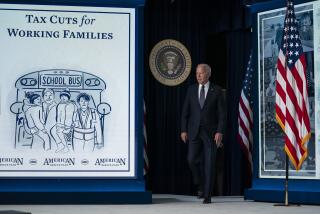Senate Votes to Give Child Credit to Poor
WASHINGTON â Barraged by complaints that the working poor did not gain from the new tax cut law, the Senate moved with unusual speed Thursday to pass a bill extending the benefits of a $1,000-per-child tax credit to millions of low-income families.
To broaden support for the initiative, the measure also calls for a new benefit for upper-income families: It would make the full $1,000 per-child tax credit available to couples earning as much as $150,000 a year. Currently, the income limit for the full credit is $110,000.
The bill, approved by a landslide 94-2 vote, represents an effort by some GOP leaders in Congress to douse a political firestorm that has raged since President Bush signed the $350-billion tax cut bill last week. That law included an increase from $600 to $1,000 in the tax credit that millions of middle-income families can take for each child.
But Democrats and liberal activists spotlighted what they called a major inequity: The law did not include a Senate-passed provision guaranteeing that about 6.5 million families earning from $10,500 to $26,625 a year -- too little money to pay federal income taxes -- would get a benefit comparable to the tax-credit increase for more affluent families.
The Senate action improves prospects that more families, both lower- and upper-income, will receive $400 checks from the Treasury this summer as a result of the increase in the per-child credit.
Pressure to act has built to the point that House Republican leaders, who have been cool to expanding the child credit to lower-income parents, are preparing a bill of their own for a vote as early as next week, said John Feehery, spokesman for House Speaker J. Dennis Hastert (R-Ill.).
Senate sponsors say they hope that President Bush will sign a bill within the next week or two, so that checks to the working poor will go out at the same time as those for other taxpayers. The first batch of checks is scheduled to be sent at the end of July.
âMy bottom line is to get a bill to the presidentâs desk as soon as possible,â said Senate Finance Committee Chairman Charles E. Grassley (R-Iowa), who co-sponsored the bill.
However, big obstacles remain, because House leaders want the low-income relief to be part of a much broader tax cut bill. They are drafting a much more extensive and costly bill that would include a provision to make permanent the $1,000 credit, which now is scheduled to drop to $700 in 2005. That could cost the government more than $80 billion over 10 years.
The bill passed by the Senate, in contrast, would cost the government $10.5 billion -- but it would be fully offset by a provision increasing the fees charged by the U.S. Customs Service.
House and Senate differences over the cost and extent of this tax bill could prove difficult to resolve. Sponsors of the Senate bill said their best hope for quick action was to win strong backing from the White House, putting pressure on House GOP leaders.
âI think the White House is going to be very supportive,â said Sen. Olympia J. Snowe (R-Maine), a lead sponsor of the measure. âHopefully, the House will look at it and see there is overwhelming support.â
âWe are pleased that the Senate has acted,â said Scott McClellan, a White House spokesman, âand we will continue to work with Congress to address it.â
At the core of some Republicansâ objections to the bill is opposition to expanding the benefits of tax breaks to people who do not pay income taxes -- an approach to tax policy that is not limited to the per-child credit. Tax legislation sometimes authorizes cash payments, instead of tax credits, to people who make too little money to owe federal income taxes. Critics of such policies, known as ârefundableâ tax credits, say that amounts to another form of welfare, not tax relief.
âThere are a lot of other things that are more important than that,â House Majority Leader Tom DeLay (R-Texas) said earlier this week. âTo me, itâs a little difficult to give tax relief to people that donât pay income tax.â
During debate on the Senate bill, however, proponents said such ârefundsâ are justified because working-poor families do pay other types of taxes.
âThey have payroll taxes, they pay excise taxes,â said Sen. Blanche Lambert Lincoln (D-Ark.), lead sponsor of the bill. âThese are taxes that never see cuts.â
But Sen. Don Nickles (R-Okla.), one of two senators to vote against the bill, complained that in some instances the payments would exceed the amount the parents pay in other taxes.
The legislationâs roots go back to Bushâs 2001 tax cut, under which the child credit was scheduled to increase gradually to $1,000 by 2010 -- and was to be refundable to lower-income families.
The tax legislation signed by Bush two weeks ago accelerated the credit increase, making it $1,000 in 2003 and 2004, and applying the increase retroactively -- as of Jan. 1, 2003. But the new law did not speed up the companion provision benefiting lower-income families.
Democrats have been hammering away at Republicans for that omission. House Democrats have used stalling tactics on the floor, raised the issue in debate on unrelated issues and voted against routine bills in protest.
Liberal groups have been issuing almost daily analyses of the lawâs impact, such as a Childrenâs Defense Fund report, released Thursday, concluding that 1 million children of military and veteransâ families would be denied the benefits of the tax credit because their parentsâ salaries fell below the $26,625 cutoff.
On Monday, Snowe and Lincoln introduced legislation to give the additional relief to low-income families and quickly rounded up a majority of the Senate to support it. Faced with their likely victory, GOP leaders agreed to the compromise approved by the Senate.
To sweeten the bill, the compromise included the provision allowing larger numbers of higher-income married couples to qualify for the child credit.
Under current law, married couples are eligible for the full tax credit if they earn up to $110,000; the income cutoff for single parents is $75,000. The proposed increase for married couples is designed to make it twice the cutoff for individuals -- a change sought by those who have been pushing for more equity in the tax treatment of married couples.
Under the bill, married couples who make up to $115,000 could claim the full credit in 2008-09, rising to $150,000 in 2010.
More to Read
Get the L.A. Times Politics newsletter
Deeply reported insights into legislation, politics and policy from Sacramento, Washington and beyond. In your inbox three times per week.
You may occasionally receive promotional content from the Los Angeles Times.











